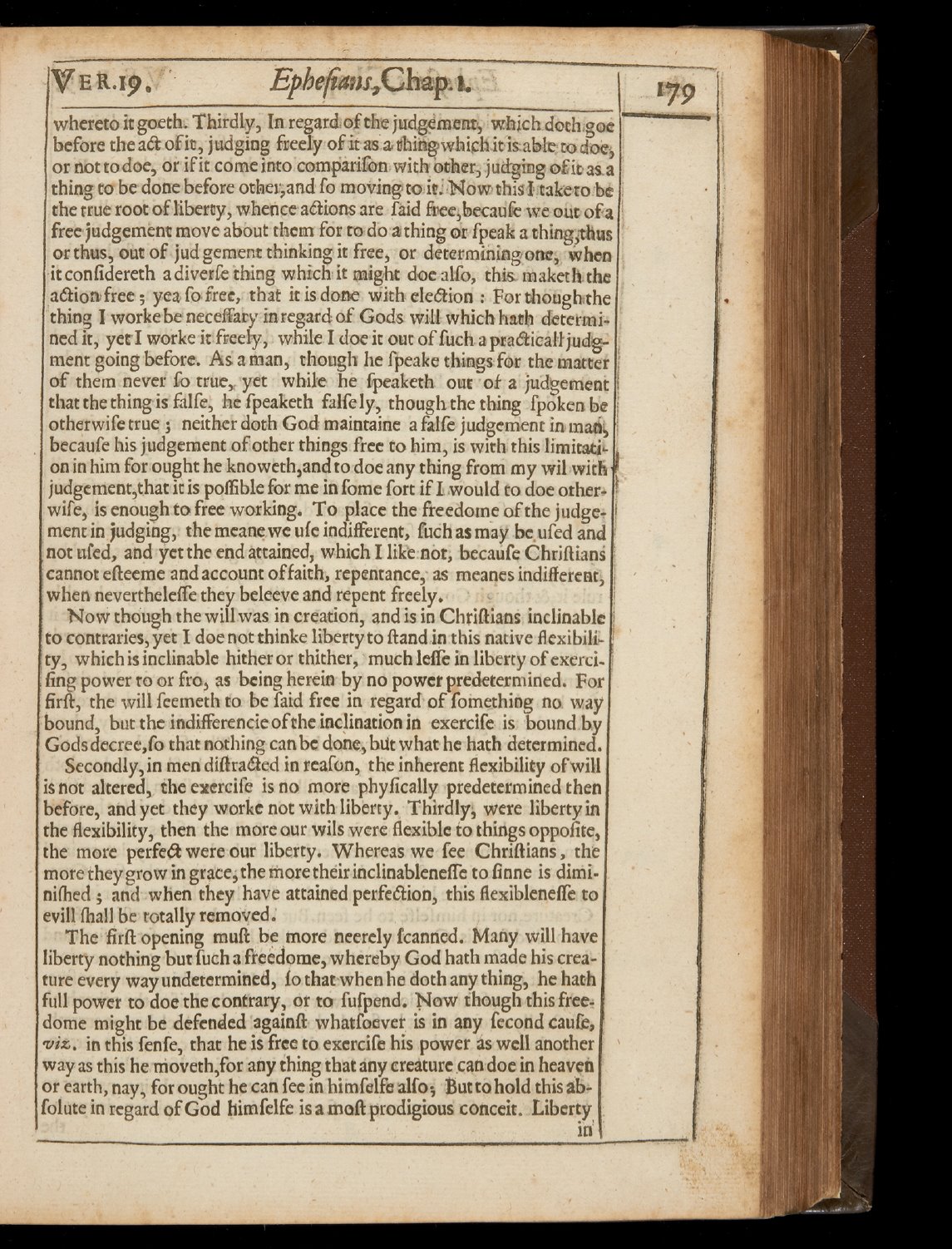

V
E
it.19.
Ephefianr,Ehap
!.
I
I79
whereto
it
goeth.
Thirdly,
In
regard:
of
the judgement, which
dothgoe
before the
ad
ofit,
judging
freely
of
it
as
a
thiÌ
g
which
it
¡sable to doe;
or
not todoe, or
if
it
comeinto
comparifon.
with
'other,
judging
of
it
as a
thing to
be
done before other,and
fo
moving
to
it:
Now
this
I
take
to be
the
true
root
of
liberty, whence
a6ìions
are
faid
free,becauffe
we
our
of
a
free
judgement
move about
them for to
do
a
thing or
fpeak
a
thing;thus
or
thus, out
of
jud
gement thinking
it
free, or
determiningone,
when
itconfidereth
a
diverfe
thing which
it might doe allo,
this_
maketh the
aElionfree
;
yea
fo
free,
that
it
is
done
with
eleótion
:
For thongh.the
thing I worke
be
neceffary
inregard
of
Gods
will which
hash
determi-
ned
it,
yetI
worke it
freely, while I doe
it
out
of
fuch
a
praéticalljudg-
ment
going before.
As
a
man,
though
he fpeake
things for the matter
of
them never fo true, yet while
he
fpeaketh
out of
a
judgement
that the thing
is
ftlfe,
he
1peaketh
falfely, though the thing fpoken
be
otherwife true
;
neitherdoth
God
maintaine a
falfe
judgement in
matt,
becaufe
his
judgement
of
other things
free
to him,
is
with
this
limitati
on
in
him
for
ought
he
knoweth,andto doe any thing from my
wilwith
judgement,that it
is
poffible
for me
in fome
fort
if
I.
would to doe other-
l
wife,
is
enough
to
free working.
To
place
the freedome
of
the
judge-
ment
in
judging, the
meanewe ufe indifferent, fuch as may
be,
ufed
and
not ufed,
and
yet the
end attained,
which
I
like
not,
becaufe Chri(tians
cannot etleeme and account
offaith,
repentance,
as
meanes indifferent
when
nevertheleffe
they beleeve
and repent
freely.
Now
though the
willwas
in
creation,
and
is in
Chriftians inclinable
to
contraries, yet
I
doe
not
thinke liberty
to
ftand
in
this native
flexibili-
ty,
which
is
inclinable hither
or
thither,
much
leffe in
liberty
of
exerci-
fing
power to or
fro,
as
being herein
by
no
power predetermined. For
firft, the
will feemeth
to
be
faid
free in
regard
of
fomething
no.
way
bound, but the indifferencieofthe
inclination in exercife
is
bound by
Gods decree,fo that nothing
can be
done, but
what
he
hath determined.
Secondly,
inmen
difttaued
in
reafon,
the
inherent flexibility
of
will
is
not altered, the
exercife
is
no
more
phyfically predetermined
then
before,
and
yet they worke not with liberty.
Thirdly;
were liberty
in
the flexibility, then the more our wils were flexible
to
things oppofite,
the more perfect were
our
liberty.
Whereas
we
fee
Chriftians,
the
more
theygrow
in
grace;the moretheir
inclinableneffe
to
finne
is
dimi-
nifhed
; and
when
they
have attained perfection, this
flexibleneffe
to
evill thall
be
totally removed.
The
firft opening mutt
be
more neerely fcanned. Many will have
liberty nothing
but
fuch
a
freedome, whereby
God
hathmade
his crea-
ture every way undetermined,
fo
that
when he
doth
any
thing, he hath
full
power
to
doe the
contrary, or
to
fufpend.
Now
though this
free-
dome might be defended againft wharfoever
is
in
any fecond caufe,
viz,
in
this fenfe,
that
he
is
free
to
exercife his
power
as
well another
way
as
this he
moveth,for
any
thing that
any creature can
doe
in
heaven
or
earth, nay, for
ought
he can
fee in
himfelfe
alfo;
But
tohold
this ab-
folute
in
regard
of
God
himfelfe
isa
molt
prodigious conceit.
Liberty
in

















